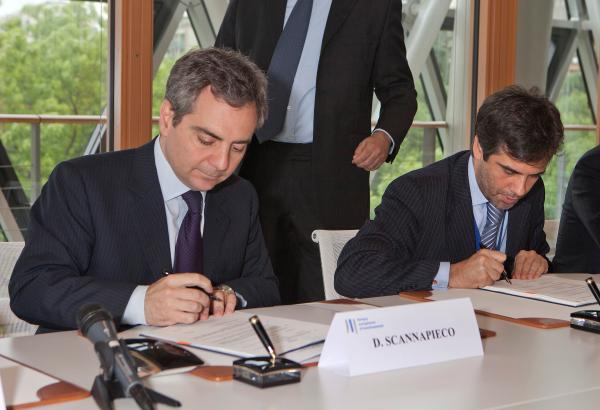
The European Investment Bank (EIB) welcomed a delegation from the Republic of Serbia to the EIB’s headquarters in Luxembourg on Monday 16 May. The EIB was represented by Dario Scannapieco, Vice-President responsible for operations in the Western Balkans, and the Republic of Serbia by the Deputy Prime Minister Bozidar Djelic, the Minister of Economy and Regional Development, Nebojsa Ciric, and the Governor of the National Bank of Serbia, Dejan Soskic. In the discussion prior to the signing ceremony, Vice-President Scannapieco addressed with the Serbian Ministers and the Governor all the main issues concerning EIB activity in Serbia aimed at helping the country on its path towards integration into the European Union.
On the same occasion, the following loans for a total of EUR 650 million were signed:
- a EUR 150 million loan for small and medium-sized enterprises (SMEs) and Mid-Caps;
- a EUR 500 million loan for the investment programme carried out by Fiat Auto Serbia.
Support for SME sector
The loan for SMEs and Mid-Caps (also called "Apex loan") is aimed at financing the projects of SMEs and Mid-Caps, which are considered to be the driving force of the Serbian economy. The objective of the loan is to provide support for the development of the country's financial system in favour of SMEs and Mid-Caps in order to sustain Serbia’s economic recovery path.
This is the fourth Apex operation in Serbia since 2000. The last one totalling EUR 250m was successfully allocated in support of local SMEs in 2009 and 2010.
Fiat Auto Serbia
The project concerns investment in the modernisation and expansion of the production capacity of an automotive plant in Kragujevac, Serbia, which is owned by Fiat Auto Serbia, a joint venture between Fiat Group Automobiles S.p.A. (FGA) and the Republic of Serbia. The financing is expected to have significant multiplying effects on the local economy and employment. Moreover, the operation will promote the establishment of suppliers that have decided to set up their production in the region.
The project’s scope comprises the production of a new multi-purpose vehicle and is fully in line with the EIB’s lending policy for the transport sector according to European Commission guidelines. The loan will also benefit from a EUR 200m guarantee of SACE (the Italian export credit agency, owned by the Italian Ministry of Economy).
EIB results in the Western Balkans and in Croatia in 2010
The EIB is the bank of the European Union. Founded in 1958 under the Treaty of Rome, it operates in the 27 EU Member States and more than 130 other countries. In 2010, it signed loans totalling EUR 72 billion, with over 90% of its financing going to projects within the Member States, EFTA and the Candidate and Potential Candidate countries. It is the largest supranational borrower and lender in the world and the only international financial institution politically accountable to EU policymakers and institutions.
The EIB has been active in the Western Balkans and in Croatia since 1977 and is today the largest international financier in the region. Over the past ten years, the Bank has financed projects totalling EUR 7bn in the area. Since 2001, it has signed loans worth EUR 3bn in Serbia.
In 2010 the EIB provided loans in the Western Balkans totalling EUR 914m (in addition to EUR 511m in Croatia), confirming the Bank as the largest international financier in the region.
The focus of its lending is on projects promoting all major infrastructure sectors (transport, energy, health and education, water and sanitation) as well as small and medium-sized enterprises (SMEs), industry, services and local authorities.
In November 2010 the EIB opened a new regional representative office in Belgrade with two different goals: to further the development of EIB activity in the region and to stress the commitment of European institutions to supporting the area with a view to membership of the European Union.
The EIB plays an active role in the development of the Western Balkans Investment Framework (WBIF), an initiative whose purpose is to facilitate the preparation and financing of priority projects under the EU’s pre-accession process. The WBIF is being developed jointly with the European Commission, the EBRD and the Council of Europe Development Bank as well as EU Member States and blends available grants and loans for priority projects in the region. In 2010, the first year of its existence, the WBIF directly provided EUR 39m worth of grants for 39 projects, which will receive loans of EUR 2.6bn, mobilising investment of some EUR 5.2bn.

Photographer: EIB ©EIB
Download original

Photographer: EIB ©EIB
Download original

Photographer: EIB ©EIB
Download original

Photographer: EIB ©EIB
Download original

Photographer: EIB ©EIB
Download original

Photographer: EIB ©EIB
Download original

Photographer: EIB ©EIB
Download original